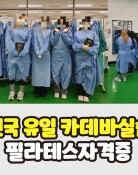Chinese Companies to Seek Early Entry into North Korea
Chinese Companies to Seek Early Entry into North Korea
Posted August. 24, 2004 21:54,
Chinese companies are starting to invest in North Korea in full swing.
The North Korean authority has asked for bold economic cooperation from the outside world since taking measures to improve economic management on July 1, 2002. Chinese companies are showing interest in securing an early mover advantage in the future North Korean market.
Nanjing-based Panda Electronics Group Company established a joint venture with North Korea in September 2002 and has won a contract to supply computers to North Korean government organizations.
After an affiliated enterprise of Shenyang-based Wujin Group jointly established a car lubricant factory with a North Korean company, it monopolized the North Korean lubricant market.
Pyongyang First Department Store, the largest in North Korea, has recently been leased to Shenyang Zhongxu Group for 10 years. Chinese companies have proactively invested in other industries in the North, including transportation, textile, and service.
What these Chinese companies, which rush into the North Korean market, have in common is that they pursue opening a new market in the long-term rather than gaining short-term profits.
Participating in the international product fair held in Pyongyang last May, Chief Executive Jin Ding of Chinas Huaao Yalu River Beer Co. Ltd. said that his company did not earn much from the North Korean business at the moment, but it has set up a plan to create a brand and enter into the market first and then to make money.
In its part, the North Korean authorities have provided various incentives to attract more investment from Chinese companies.
In the case of Pyongyang First Department Store, the investing company receives exceptional tax incentives of only five percent import tariff, five percent income tax, and nothing else. A Chinese businessman from Dandong who runs restaurants, sauna facilities, and karaoke joints, said, The North Korean authority even takes the responsibility of tax payment.
The Chinese governments initiative in entering North Korea is another factor that encourages the private sector.
The Chao Hua You Lian Culture Exchange Corporation, which inaugurated last February in Beijing, is a de facto public corporation for trade with North Korea.
The government-led corporation will send 3,000 business people to North Korea yearly, and last month, 100 people went to North Korea. Meanwhile, 40 Chinese government delegates went to China to discuss North Korea investment and joint projects.
zsh75@donga.com







